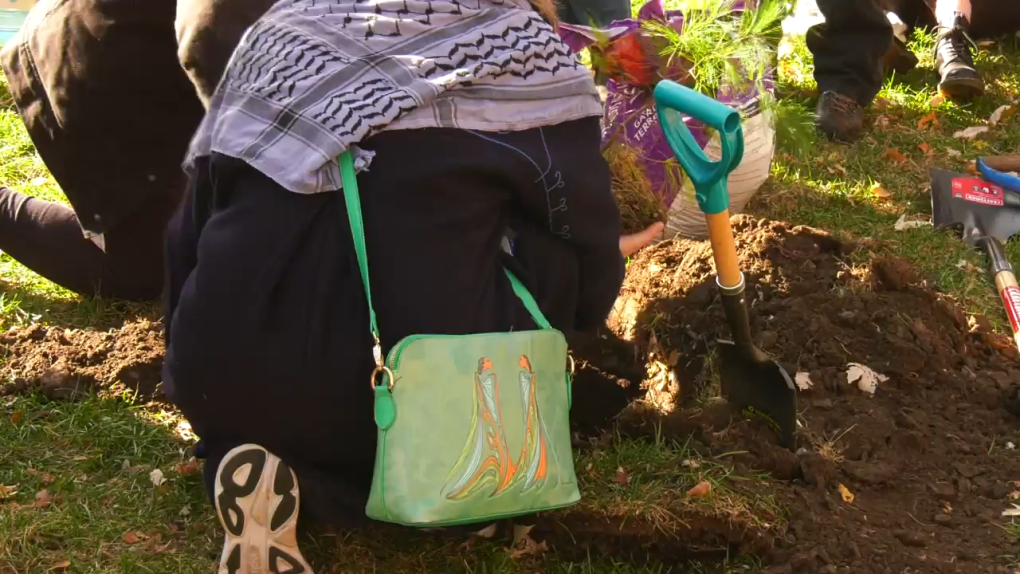Activists plant ‘peace tree’ on McGill University campus in solidarity with Palestinians
 Activists planted a pine on McGill University's downtown campus to promote peace.
Activists planted a pine on McGill University's downtown campus to promote peace.
Activists gathered on McGill University’s downtown campus on Sunday to plant a tree in "hopes for justice in Palestine, here in Tio’tià:ke (Montreal) and for all oppressed peoples around the world.”
Katsi'tsakwas Ellen Gabriel said the great white pine is a symbol of peace. The small tree was brought from Kanesatake and was being planted to promote peace among all people. The tree planting ceremony was held by the Traditional Longhouse Women on the university’s lower field, where a pro-Palestinian encampment stood for over two months last spring.
Though injunction requests were filed in Quebec court, they were rejected, and a private security firm hired by McGill dismantled the camp in July. Activists said McGill has been suppressing students’ free speech when it comes to dissent against Israel.
Though McGill told Gabriel and other activists that they were not allowed to plant the tree on campus, security didn’t stop the activists.
Attendees gave speeches to “stand up against an administration actively working with the occupation [of Palestinian lands],” denounce “complicity in the genocide in Gaza,” and push McGill to divest from companies they say have ties with Israel — one of the core demands of the encampment activists.
According to The Palestinian Ministry of Health, more than 44,000 Palestinians have been killed in Israeli strikes since Hamas’ Oct. 7 attack on Israel that killed 1,200 people and saw 250 taken as hostages. Thousands more are buried under rubble and threatened by illness and injuries.
McGill didn't approve tree planting
Though many donned keffiyehs and carried Palestinian flags, others carried Lebanon’s flag and the Mohawk Warrior Society flag. Gabriel said the tree planting was “a gesture of solidarity for all those who are fighting for peace and for people everywhere.”
She also said the way McGill treats its students while saying it promotes decolonization and reconciliation is “disgraceful.”
“It’s important to promote this message of peace. We want wars to stop, we want peace for everybody and nobody is listening. It’s all political rhetoric,” said Gabriel.
McGill said it had been informed twice that a group planned to plant the pine as a “permanent monument."
“When we indicated that this plan would not be approved, we received a reply stating ‘We reiterate that we will be planting a tree of peace on Nov. 17,’ and that ‘We will decide what to do on our homelands,’” McGill said in an email.
McGill said it had “various reasons” to reject the tree's planting, like needing the space for “various university activities,” and the university’s "intention not to adopt positions on geopolitical conflicts.”
It added that “McGill’s commitment to the spirit of reconciliation is enduring” through other university initiatives.
“However, our academic mission guides all that we do – including the use of our buildings, grounds, and other private property – and we retain the right to determine how university property is used,” it said.
Gabriel pushed back, saying “there’s a lot of talk about decolonization and reconciliation” but reminded McGill that “you are on our homeland, and we want you to act peacefully.”
It’s unclear whether the university will remove the tree, but “it would look awful if McGill removed the tree which is a symbol of peace that the world badly needs,” said Gabriel.
CTVNews.ca Top Stories

Quebec man, 81, gets prison sentence after admitting to killing wife with Alzheimer's disease
An 81-year-old Quebec man has been sentenced to prison after admitting to killing his wife with Alzheimer's disease.
Canada Post quarterly loss tops $300M as strike hits second week -- and rivals step in
Canada Post saw hundreds of millions of dollars drain out of its coffers last quarter, due largely to its dwindling share of the parcels market, while an ongoing strike continues to batter its bottom line.
Trump chooses Bessent to be Treasury secretary and Vought as top budget official
President-elect Donald Trump announced Friday that he'll nominate hedge fund manager Scott Bessent, an advocate for deficit reduction, to serve as his next treasury secretary. Trump also said he would nominate Russel Vought to lead the Office of Management and Budget.
'Immoral depravity': Two men convicted in case of frozen migrant family in Manitoba
A jury has found two men guilty on human smuggling charges in a case where a family from India froze to death in Manitoba while trying to walk across the Canada-U.S. border.
Pat King found guilty of mischief for role in 'Freedom Convoy'
Pat King, one of the most prominent figures of the 2022 'Freedom Convoy' in Ottawa, has been found guilty on five counts including mischief and disobeying a court order.
Trump supporters review-bomb B.C. floral shop by accident
A small business owner from B.C.’s Fraser Valley is speaking out after being review-bombed by confused supporters of U.S. president-elect Donald Trump this week.
Nearly 46,000 electric vehicles recalled in Canada over potential power loss
Nearly 46,000 electric vehicles from Kia, Hyundai and Genesis are being recalled in Canada over a potential power loss issue that can increase the risk of a crash.
Canada's tax relief plan: Who gets a cheque?
The Canadian government has unveiled its plans for a sweeping GST/HST pause on select items during the holiday period. The day after the announcement, questions remain on how the whole thing will work.
Grey Cup streaker fined $10K, banned from BC Place
The woman who ran across the field wearing nothing but her shoes at last weekend’s Grey Cup has been given a fine and banned from BC Place.

































